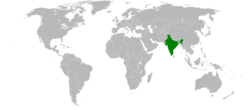India–Vanuatu relations
India–Vanuatu relations are bilateral relations between the Republic of India and the Republic of Vanuatu. The Indian High Commission in Suva, Fiji is jointly accredited to Vanuatu. Formal relations between the two countries began in 1986, after then prime minister Walter Lini joined the Non-Aligned Movement in 1983.[1]
 | |
India |
Vanuatu |
|---|---|
India and Vanuatu are both Commonwealth republics.
History
Diplomatic relations between India and Vanuatu were established in 1986. The Indian High Commission in Canberra, Australia was accredited to Vanuatu until August 2000, when it was transferred to the Indian High Commission in Port Moresby, Papua New Guinea. Accreditation was transferred again to the Indian High Commission in Suva, Fiji in June 2014.[2]
The first time an Indian Prime Minister met a Vanuatuan Prime Minister (or deputy) was in 1983 when the two leaders arrived for the Non-aligned Summit meeting in New Delhi.[3]
Diplomatic relations officially began between the Republic of India and the Republic of Vanuatu began during the late Cold War period in 1986, after Vanuatu formally joined the Non-Aligned Movement. This made it the only country in Oceania not to join the Western Bloc.
Enhanced co-operation since 2014
India's Prime Minister Narendra Modi joined the inaugural India-Pacific Island Countries Forum Summit in November 2014 in Suva, where a delegation including Vanuatu's Foreign Affairs Minister was present. Prime Minister Modi announced new programmes to benefit India and the Pacific Countries, including Vanuatu. These announcements included:
- An increase of "Grant-in-Aid" from US$125,000 to $200,000 annually to each of the 14 Pacific Countries for community projects of their choice.
- A visa on arrival for Indian citizens traveling to Pacific Island countries in the forum.
- A trade office in India for all Pacific Island countries in the forum.
- A new visitors programme for Pacific Island countries.
Prime Minister Modi also proposed the idea of a regular 'Forum for India-Pacific Islands Cooperation', designed to enhance dialogue between India and the Pacific Countries.[4][5]
Bilateral trade
India is Vanuatu's 5th largest export destination, with US$ 5.5 million worth of goods sent in the 2013-2014 year.[6] This makes up 1.5% of all of Vanuatu's exports and is an increase from US$ 5.37 million in the 2012-2013 year.
Vanuatu imports US$ 3.5 million worth of goods from India, making up 1.3% of Vanuatu's imports.[7] This is a 29% increase from the US$ 2.67 million in the 2012-13 year, and an 867% increase since 2000.[8] India is currently Vanuatu's 13th largest exporter.
Indian foreign aid
India provides annual grant-in-aid for development projects in Vanuatu, as part of its Regional Assistance Initiatives for Pacific Island countries.[2]
After the devastation of category 5 Cyclone Pam, India also gave cash assistance of US$ 250,000.[9]
During Indian Minister of Power Piyush Goyal's visit to Vanuatu in October 2016, India provided Vanuatu a $200,000 grant for LED bulbs and other energy efficient equipment. India also provided $190,000 to Bruno Leingkone Tau to install informational and communications technology equipment in 76 schools in the country. The two countries also signed an agreement to establish an India-Vanuatu Centre of Excellence in IT (CEIT).[10][11]
References
- "Archived copy" (PDF). Archived from the original (PDF) on 2015-01-28. Retrieved 2015-03-28.CS1 maint: archived copy as title (link)
- "India-Vanuatu Brief" (PDF). Ministry of External Affairs. June 2015. Retrieved 9 January 2017.
- http://www.mea.gov.in/Portal/ForeignRelation/Vanuatu_December_2014.pdf
- http://timesofindia.indiatimes.com/india/PM-Modi-woos-Fiji-days-ahead-of-Xis-visit/articleshow/45211853.cms
- http://www.mapsofindia.com/my-india/india/modi-in-australia-fiji-firming-up-strategies-for-pacific-region
- http://atlas.media.mit.edu/profile/country/vut/
- http://atlas.media.mit.edu/profile/country/vut/
- http://atlas.media.mit.edu/explore/tree_map/hs/import/vut/show/all/2000/
- "India gives 250,000 USD to cyclone-ravaged Vanuatu". News18. 18 March 2015. Retrieved 9 January 2017.
- "India to supply Rs 1.34 cr LED bulbs, equipment to Vanuatu". The Economic Times. Retrieved 9 January 2017.
- Roberts, Anita. "India-Vanuatu relation boost". Vanuatu Daily Post. Retrieved 9 January 2017.
